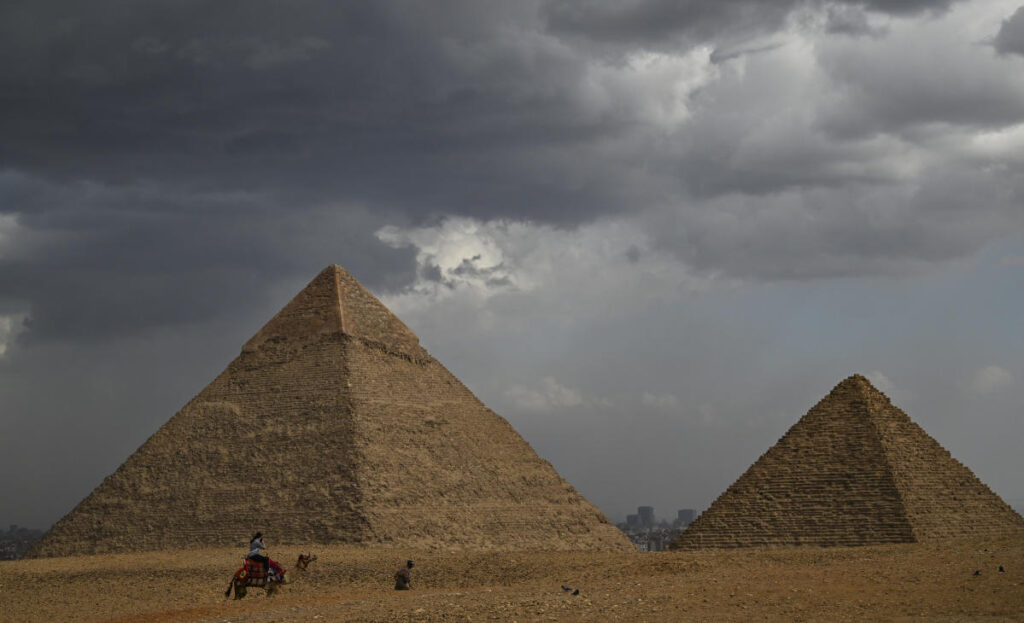CAIRO (AP) – The European Union on Sunday announced a 7.4 billion euro ($7.4 billion) grant to cash-strapped Egypt, amid growing concerns that economic pressures and conflict in neighboring countries could push more migrants into Europe. 8 billion) was announced.
The agreement, which has drawn criticism from human rights groups over Egypt's human rights record, was announced in Cairo on Sunday afternoon by Egyptian President Abdel Fattah el-Sisi, European Commission President Ursula von der Leyen, Belgium, Italy and It was signed at a ceremony attended by Austrian leaders. Cyprus and Greece.
El-Sissi met separately with von der Leyen and other European leaders before the signing ceremony on Sunday afternoon.
The aid package includes both grants and loans for the Arab world's most populous country for the next three years, according to the EU mission in Cairo. Most of the funding – 5 billion euros ($5.4 billion) – will be macro-financial support, according to a document from the EU delegation to Egypt.
The mission said the two countries have promoted cooperation to the level of a “strategic and comprehensive partnership”, paving the way for greater cooperation between Egypt and the EU in various economic and non-economic fields.
El-Sissi's office said in a statement that the agreement aims to be “a major leap forward in cooperation and coordination between the two countries and the achievement of common interests.”
The agreement, known as the Joint Declaration, aims to promote “democracy, fundamental freedoms, human rights and gender equality,” among other things, according to the European Commission. The two countries will also deepen cooperation to address challenges related to migration and terrorism.
The EU will provide support to the Egyptian government to strengthen its border with Libya, a key transit point for migrants fleeing poverty and conflict, particularly in Africa and the Middle East. The 27-nation bloc also plans to help the government host Sudanese people who have fled fighting between rival generals in their country for nearly a year. Egypt has hosted more than 460,000 Sudanese since April last year.
The agreement comes amid growing concerns that an Israeli ground offensive on Rafah, the southernmost town in the Gaza Strip, is looming and could force hundreds of thousands of people into Egypt's Sinai Peninsula. . The Israel-Hamas war is now in its sixth month, with more than 1 million people forced into Rafah.
Egypt says it has 9 million migrants, including around 480,000 refugees and asylum seekers registered with the United Nations refugee agency. Many of these migrants have started their own businesses, while others work as street vendors or house cleaners in the large informal economy.
For decades, Egypt has been a haven for migrants from sub-Saharan Africa seeking to escape war and poverty. Egypt is both a destination and a refuge for some, as it is the closest and most accessible country to them. For others, it is a way station before attempting the perilous Mediterranean crossing to Europe.
Although Egypt's coast is not a major starting point for smugglers and human traffickers sending packed ships across the Mediterranean to Europe, Egypt faces migration pressure from the region and the Israeli-Hamas war has pushed its borders closer to home. Added to this is the immediate threat of spillover beyond the borders. .
The deal provides much-needed funding to Egypt's economy, which has been hit hard by years of government austerity, the coronavirus pandemic, the fallout from Russia's full-scale invasion of Ukraine, and, most recently, the Israeli-Hamas war in Gaza. will be injected.
Earlier this month, after marathon negotiations, Egypt reached an agreement with the International Monetary Fund to increase its bailout loan from $3 billion to $8 billion. The agreement with the IMF was combined with economic reforms, including a buoyant Egyptian pound and a significant hike in key interest rates.
The EU deal follows the template of recent agreements signed with Tunisia and Mauritania, which pledge funds in return for strengthening their borders. Tunisia and Mauritania, important jumping off points for migrants crossing the Mediterranean and Atlantic Ocean to Italy and Spain respectively, have also been criticized for alleged mistreatment of migrants.
The package drew criticism from international human rights groups over Egypt's human rights record. Amnesty International called on European leaders not to be complicit in human rights abuses occurring in Egypt.
“EU leaders must ensure that the Egyptian authorities adopt clear standards on human rights,” said Yves Guedi, Amnesty International's director of European institutions. He pointed to restrictions and repression of civil society.
Asked in Brussels earlier this week about the morality of such an agreement, European Commission spokesperson Eric Mamer acknowledged that there were problems with all these countries, but nevertheless defended the partnership.
“Yes, we know that there are criticisms related to human rights in those countries and it is clear that this is an issue,” he told reporters.
“Does that mean we should sever all ties? Will that lead to an improvement in the situation? Or should we cut ties with those countries in order to improve conditions on the ground, both for local people and for migrants coming to those countries? Should we find a way to work with them?'' he said.
___
Renata Brito in Barcelona, Spain, and Lorne Cook in Brussels, Spain, contributed to this report.


